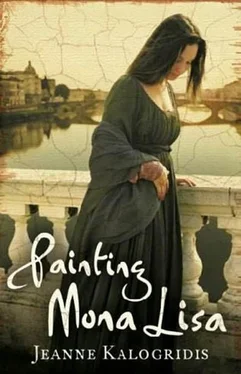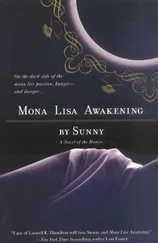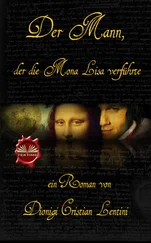Now both priests were frowning. “We know no one by that name,” the older priest said firmly. “I’m sorry, Madonna, but we have tasks to attend to.” With his free hand, he pushed open the heavy door to admit his fellow, then entered himself and let it close on me.
I paced there a moment, hoping that another priest might come by. Had no one gotten the message? Had Piero been captured? Surely Leonardo had no reason to draw me into a trap…
The priests emerged from the sacristy to find me still there. “Go home!” the younger commanded, exasperated. “Go home to your husband!”
“This is unseemly, Madonna,” the elder said. “Why have you come here asking about a man? Where is your escort?”
It occurred to me then that it might be assumed Gian Giacomo was the name of my lover, whom I intended to meet for a tryst. In these days of Savonarola’s reign, an accusation of adultery would be as dangerous as my true mission; I apologized and hurried from the church.
I rode home, unnerved and angry. Leonardo had just made a fool of me, and I had no idea why.
O nce home, I went straight to the nursery and sat with Matteo in my arms. I did not want to see Zalumma, to face her silent scrutiny when I was angry and liable to talk. I ordered the wet nurse to leave and rocked my son. When Matteo reached up and pulled a tendril of my hair-so hard that it caused real pain-I permitted myself to cry a bit.
I had not realized until then just how badly I had wanted to do something that would permit me to honor Giuliano’s memory. Since his death, I had been forced to keep silent about him, to behave as though my marriage to him had never occurred. Now, my hopes had been turned into an ugly joke.
I had been alone with my son for almost an hour when Zalumma arrived quietly and stood by the door. “I thought you might be hungry,” she said softly.
I shook my head. She turned to leave, then stopped and glanced beyond the door to make certain no one stood out in the hallway.
“Someone left a letter,” she said quickly. “On the table by your bed. Elena or Isabella is bound to notice it soon.”
I handed Matteo to her without a word, went to my room, and closed the door behind me.
The paper was pristine white, with neatly trimmed edges, and, as I knew even before I unfolded it, completely blank.
The morning had been cold, and a feeble fire still burned in the hearth. I walked over to it and held the paper low, close to the flames, and crouched so that I could read the pale brown letters as they emerged:
Forgive me. God will explain tomorrow, when you go at noon to pray.
I threw the paper onto the fire and watched as it burned.
I said nothing to Zalumma. The next day at noon I went to the chapel at Santissima Annunziata to pray.
This time, when the Devil-cum-monk named Salai approached me, I glared at him. Once in the wagon, he tied the cloth around my eyes and whispered, “This time, it truly is only for your protection, Monna.” I did not speak. When the blindfold was at last loosed and I sat looking into Leonardo’s face, I did not smile.
His voice and manner were hushed and sympathetic. “I am sorry, Madonna Lisa,” he said. Lean and tall in his loose monk’s robes, he stood in front of the paper-covered window. The stubble was missing; he had shaved recently, and his sculpted cheek bore the red nick of the razor. The easel was empty; the wooden slate with the drawing now lay, covered with a layer of black soot, on the long table. “It was a cruel trick, but our situation is uncommonly dangerous.”
“You lied to me. Piero was not at the Duomo.” I faced him with cold fury.
“No. No, he was not.” He walked over to stand an arm’s length in front of me; in his pale eyes, I saw honest sympathy. “Believe me, I did not relish being so unkind. But I had to test you.”
“Why? Why would you not trust me?”
“Because you are married to a great enemy of the Medici. And because, though I have known you for a long time, I do not know you well. And… there is also the fact that I cannot trust my own judgment concerning you. I am not… a disinterested party.”
I made a sound of disgust. “Please. Don’t think you can fool me by pretending you have feelings for me. I know you can never love me-that way. I know what you were charged with. I know about you and Salai.”
His eyes widened abruptly, then narrowed again, bright with fury. “You know-” He caught himself; I watched his fists clench, then slowly uncurl. “You are speaking of Saltarelli.” His voice was coiled.
“Who?”
“Iacopo Saltarelli. When I was twenty-four, I was accused of sodomy-a simple word you seem to have trouble saying. Since you are so interested in specifics, let me give them to you. I was arrested by the Officers of the Night and taken to the Bargello, where I learned that I had been implicated in an anonymous denuncia . It was alleged that I and two other men-Bartolomeo de’ Pasquino, a goldsmith, and Lionardo de’ Tornabuoni-had engaged in various sexual activities with Iacopo Saltarelli. Saltarelli was all of seventeen. He was licentious, to be sure, and probably earned the charges-but he was also apprentice to his brother, an enormously successful goldsmith on the Via Vaccarechia. Pasquino also owned a bottega on the same street, and I frequented both shops because I was often hired by them as a painter.
“I’m sure you’ve heard of unsuccessful business owners getting rid of their rivals by a well-timed denuncia ?”
“I’ve heard that it’s done,” I said, not kindly.
“According to shop owners on the street, my denuncia was written by one Paolo Sogliano. He happened to be the painter for and assistant to a goldsmith on the Via Vaccarechia named Antonio del Pollaiuolo. The charges were dropped for lack of evidence, although many possible witnesses were questioned. And a few years afterward, Sogliano was out on the street.”
“There was no truth to it, then.” I looked down at my hands.
“There was no truth to it. I ask you to consider how you would have felt in my situation. How you would have felt, being taken from your bed at night to the jail for questioning. How you would have felt, telling your father. How you would have felt, having to rely on your connections with Lorenzo de’ Medici-asking him for help-so that you could be freed and go sleep in your own bed instead of in prison. Dante says that sodomites are doomed to wander forever in a fiery desert. I tell you, there can be no worse desert than the inside of a cell in the Bargello.” The anger left his tone; the next words came out hesitant, shy. “That does not mean I have never fallen in love with a man. Nor does it mean I have not fallen in love with a woman.”
I kept looking down at my hands. I thought of what it had been like for a young man to tell his father he had been arrested for such a crime. I thought of his father’s fury, and I flushed.
“As for Salai…” Indignance welled up in him again; the words lashed the air. “He is a boy, you may have noticed. Oh, he is your age, to be sure, though he might as well be ten years your junior; you can see for yourself that he has the maturity of a child. He is not yet old enough to know what he wants. And I am a grown man, and his guardian. To hint that there is anything more to our relationship-outside of a great deal of irritation on my part-is reprehensible.”
When I could finally speak, I said, “I apologize for my terrible words. I know what the Bargello is like. They took me there the night Giuliano died. My father was there, too. We were freed only because of Francesco.”
His face softened at once.
Читать дальше
Конец ознакомительного отрывка
Купить книгу












